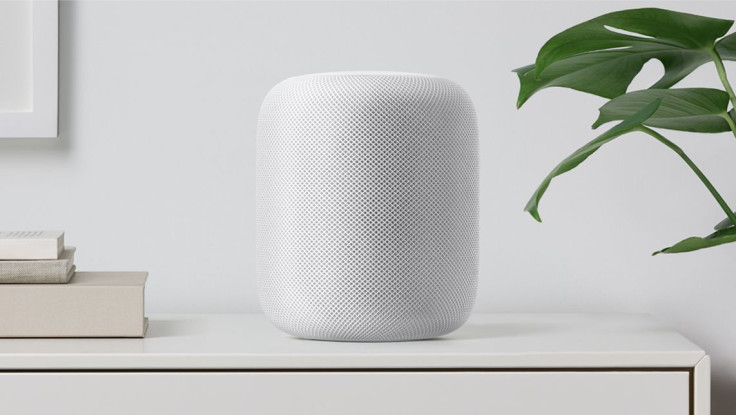HomePod Release Date: Apple May Have Shortages At Launch, Report Says

The Apple HomePod is slated to come out later this year, but it might be difficult to find on store shelves. Limited shipments at launch may give the Siri-powered home speaker a gradual rollout, according to the Nikkei Asian Review.
During an earnings conference call Monday, HomePod supplier Inventec Appliances gave further details about the new Apple device’s launch schedule. Inventec president David Ho said via the Review that the company is expecting to have a smaller amount of units when the HomePod launches this fall.
"We will finally ship the smart home device this year, but its contribution will be fairly limited and hopefully that will improve next year.” Ho said.
While Inventec did not confirm hard shipping numbers for the HomePod, analysts have pegged the company’s initial shipment of speakers for 2017 at a relatively modest 500,000 units.
Apple initially announced the HomePod earlier this year at its Worldwide Developers Conference. Priced at $349, the home speaker features a combination of high-fidelity audio and Siri-powered connectivity designed to be an alternative to similar smart home speakers from companies like Google, Microsoft and Amazon.
Currently, Inventec is Apple’s primary HomePod manufacturer, but the company is expected to get additional manufacturing assistance for the device soon. As the Review notes, Inventec will reportedly work alongside Foxconn to split HomePod production starting in 2018.
However, the potential for an initial shortage for a new Apple product won’t be a new event for possible buyers. Inventec is also the primarily supplier for Apple’s AirPods and the wireless earbuds have still remained hard to find since its 2016 launch thanks to high demand.
While the market for the HomePod is expected to be smaller than AirPods, Apple likely hopes that the speaker will have a relatively smooth rollout. For the fall and winter, Apple is slated to have a packed release calendar that includes both the HomePod and the upcoming iPhone 8. During Apple’s most recent earnings call, CEO Tim Cook admitted that Apple is still working to produce enough AirPods to stock its inventory.
"We have increased production capacity for AirPods and are working very hard to get them to customers as quickly as we can, but we are still not able to meet the strong level of demand.” Cook said.
For Apple, the company has a fair amount riding on the HomePod’s success when it launches later this year. While Apple was one of the first companies to popularize virtual assistants — Siri initially launched in 2011 — it had mostly been a bystander to current innovations in the space.
Amazon’s Alexa, which debuted in 2014, has become a juggernaut for the online retailer thanks to the Echo series of smart home devices and Alexa’s adoption by manufacturers for products ranging from TVs to home appliances. Earlier this year, Amazon also debuted the Echo Show, which adds a touch screen display and camera to Alexa’s functionality. Due to Amazon’s success, numerous competitors have entered the smart home speaker market in recent months. Google has its own Home speaker and Microsoft plans to release speakers in a partnership with Harman Kardon that feature its Cortana home assistant.
All of these competitors want to take advantage of the burgeoning smart home market for devices. As more hardware starts to gain smart home capabilities, where products like lights or TVs can be controlled via voice, these speakers can allow users to easily control all these items. Plus, they also double as a way to encourage users to stay within a product ecosystem, where users will primarily rely on services or products exclusively from a speaker’s manufacturer.
While Apple hasn’t stayed out of smart homes — its HomeKit system is featured on smart home products from a variety of manufacturers — the HomePod still represents its first significant entry into the market. And with its launch coming up soon, Apple likely hopes its initial shipments can be enough to meet consumer demand at launch.
© Copyright IBTimes 2024. All rights reserved.




















